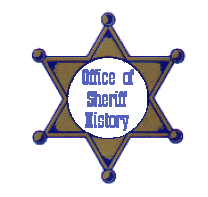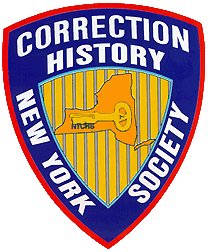 |
By Schenectady Sheriff Harry C. Buffardi© 1998. The History of the Office of Sheriff was published and copyrighted in 1998 by Schenectady County Sheriff Harry C. Buffardi. |  |
NYCHS posts
|
 |
By Schenectady Sheriff Harry C. Buffardi© 1998. The History of the Office of Sheriff was published and copyrighted in 1998 by Schenectady County Sheriff Harry C. Buffardi. |  |
NYCHS posts
|
|
On August 2, 1876, the blast of a Colt Peacemaker rang out above the sounds of the saloon patrons in Deadwood, South Dakota's Number Ten Saloon. The bullet drove through the skull of the seated cardplayer and came to rest in the arm of the man he was opposing. As the man slumped to his death he was still holding his cards. He had aces and eights, which would have been the winning hand. This variation of cards would from that time on be known as the "deadman's hand."
The dead man was none other than the notorious Wild Bill Hickok, who would breathe his last breath at age thirty-nine. It ended the spectacular career of a gunman and a lawman. He was credited with killing some thirty to eighty-five men, depending on who was doing the counting. More by his own account, but on this day, Jack McCall fired the fatal shot into Wild Bill's head that would forever stop the count. Born James Butler Hickok in 1837, he would hold many positions in his short life. At eighteen he got his first taste of violence when he was working as a muleskinner in the building of the Illinois and Michigan Canal. Another worker was tormenting him and when Hickok had enough he tossed the co-worker into the canal. When he did not see the man surface, he assumed he had killed him and fled to Missouri. Though the man was not dead, Hickok did not know it and his life's adventure would begin on that violent note. Fixed with a penchant for adventure, he worked as a bodyguard for a prominent abolitionist and a stage driver along the Santa Fe Trail. Somewhere along the Trail folks, dropped the name Jim and began calling him Bill. Perhaps because he had a huge nose and protruding upturned top lip, it was a variation or abbreviation of "Duckbill." The "Wild" addition to the name was surely deserved. . . . This wild streak proved to be an advantage during the Civil War, when he was a scout and spy for the Northern cause. After several documented and notorious killings he was appointed a deputy U.S. marshal. In 1869, Wild Bill was appointed sheriff of Ellis County, Kansas to fill a temporary vacancy. As well as being sheriff, he held a concurrent job as town marshal of Hays City, Kansas. . . . While in law enforcement Bill kept the local undertaker busy. . . . Another law enforcement encounter was as a result of Custer's 7th Cavalry being stationed at Fort Hays. General George Armstrong Custer's brother, Captain Tom Custer, was arrested by Bill for disturbing the peace. Seeking revenge on Hickok, Tom Custer gathered a few of his troops and beat Bill severely. During the melee Wild Bill wound up killing one soldier and severely wounding two more; but Custer escaped. Deciding that discretion called for him to leave law enforcement behind in Hays, Hickok pursued a career with Buffalo Bill Cody on his Wild West Show. Wild Bill's most critical biographer, William E. Connelley, has said that fear "was simply a quality he lacked." Bravery was certainly his most admirable quality but it was killing for which he would be most noted. A 1867 published report of a Hickok conversation reflects this: "I say, Bill, or Mr. Hickok, how many white men have you killed to your certain knowledge"? After some thought, Hickok replied, "I would be willing to take my oath on a Bible tomorrow that I have killed a hundred" . . . . Sometime later Hickok was again quoted regarding his killer reputation: "I suppose I am called a red-handed murderer, which I deny. That I have killed men I admit, but never unless in absolute self-defense, or in performance of an official duty. I never, in all my life took any mean advantage of an enemy. Yet understand, I never allowed a man to get a drop on me. But perhaps I may yet die with my boots on." This last sentence was indeed prophetic. . . . Wild Bill Hickok killed more than any other person to hold the office of sheriff in the Wild West. He might be described as a homicidal maniac or dauntless defender of justice depending on the point of view you wish to adopt.
William Barclay "Bat" Masterson and his older brother Ed left home and moved to Dodge City in 1872. They took up the buffalo hunting trade and lived the wild life, cashing in their pay for town sprees filled with women, whiskey, and gambling.
In 1875, during one of these indulgences, Bat received a pelvic wound in a gunfight. In 1876, while walking around Dodge, with the aid of a cane (or bat), he ran into an old buffalo hunting acquaintance named Wyatt Earp. Earp was the assistant city marshal and hired on Bat as a deputy, which began his law enforcement career. The nickname Bat is reputed to have originated from two separate and distinct sources. One legend tells us that because he walked with the aid of a cane, this stick (bat) was used as a baton or impact weapon in his law enforcement capacity. It is universally understood that Masterson used this weapon with frequency and preferred the weapon to a pistol, in most situations, to convince resisting offenders that jail was their next destination. The other source of the nickname legend is that many of his friends, including Theodore Roosevelt, called him "Bart", which was short for Bartholomiew, a variation of his middle name Barclay. . . . Wyatt Earp convinced Bat Masterson to run for sheriff of Ford County in 1877. After he was elected to the post he was anchored in Dodge City, where the county seat was located. One evening in 1878, he witnessed Jack Wagner and Alf Walker gun down his brother. Without hesitation Bat responded in kind and shot the duo on the spot, killing them both. Bat often caroused in Dodge City with Wyatt Earp and Doc Holliday. . . . Though Masterson had won the office of sheriff, he had done so by a slim three vote margin, and his sporting antics did not enhance his stature within the community. Bat and Wyatt spent so much time in Dodge City brothels seeking courtesy discounts, the two were known as the "fighting pimps". In 1879, the voters of Ford County overwhelmingly voted out Bat Masterson from his office, electing a bartender named George Hinkle to the post. By 1885, Masterson returned to Dodge City to work the faro tables at the Long Branch Saloon. He served briefly as a deputy sheriff and helped quell a mob out to tar and feather a prohibitionist who was determined to shut down Dodge's saloons. After about a year, Bat moved on and began promoting prize fights. He also wrote about the fight game and published several stories about prize fighting in various Western newspapers. Theodore Roosevelt spent considerable time in the West and valued friendships with cowboys, hunters, painters, and writers of the Old West. Remarkably, the favorite figure of the twenty-sixth president of the United States was the gunfighter, killer, gambler, saloon owner, and former sheriff - Bat Masterson. Their friendship lasted for many years and Bat was a frequent and welcome guest at the White House. As president, Roosevelt appointed Bat, the former fighting pimp, U.S. deputy marshal of New York. A year later, Roosevelt offered Bat the post of U.S. marshal of Oklahoma. Though Roosevelt knew about some of Bat's rather seedy background, he thought it would be fitting to place him back in the West. Bat contemplated the very real possibility that this position might put him in jeopardy, as his fame as a former gunfighter might inspire some "wanna-be" gunslinger to try and to make a reputation by gunning him down. Based on this, Bat declined the position and lived out the rest of his life in midtown Manhattan as a daily sports columnist, and never lost contact with Roosevelt. |
 |
|  |
|